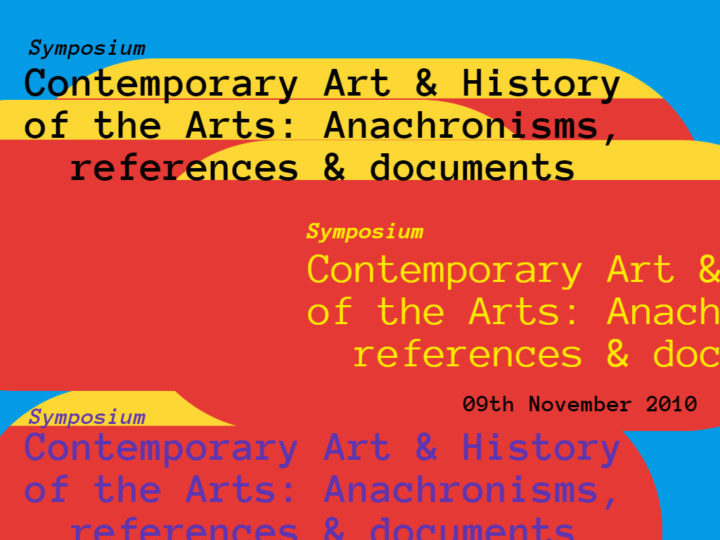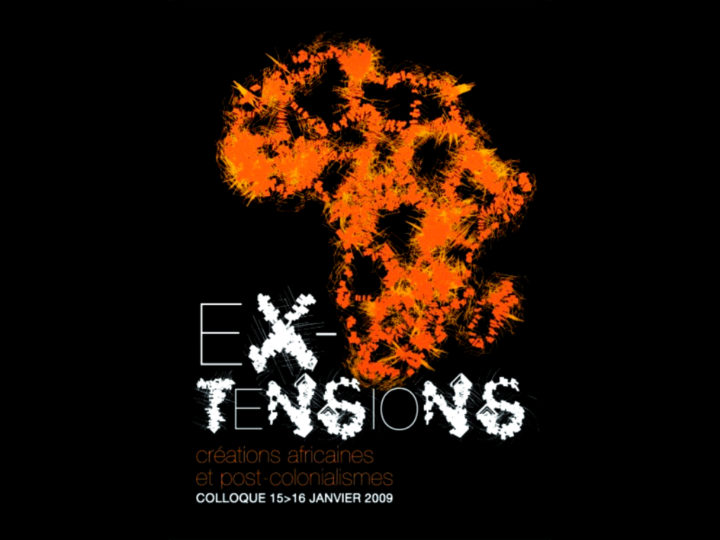Le colloque Ex-tensions : créations africaines et post-colonialismes, conçu et organisé par Larys Frogier Directeur du centre d’art contemporain La Criée, propose d’énoncer les nouveaux enjeux de la création vivante en Afrique, ses apports théoriques en Occident, ainsi que les représentations complexes posées par l’Occident sur les arts africains. L’actualité esquisse de nouvelles responsabilités sociales, politiques, culturelles et intellectuelles à la construction de l’histoire et laissent envisager les possibles d’une organisation sociale capable de dépasser les questions de race. Mais dans le même temps, il nous faut aussi réinterroger notre capacité à l’oubli ou à l’occultation devant par exemple le refus en France de faire aboutir en 2008 l’ambitieux projet d’un Centre national pour la mémoire des esclavages et de leurs abolitions.
PROGRAMME DU COLLOQUE
15 janvier 2009
Migration des concepts, fabrique des esthétiques
9h30 : Ouverture du colloque par René Jouquand, adjoint délégué à la culture
9h45 : Larys Frogier (directeur de La Criée), “L’art en Tout-Monde”
10h30 : Manthia Diawara (cinéaste et auteur), “Les études culturelles (Cultural Studies) et la diaspora africaine”
11h30 : Yacouba Konaté (philosophe), “Le statut du contemporain dans « l’art-africanisme”
14h : Elvan Zabunyan (historienne de l’art contemporain), “Enjeux contemporains des études culturelles (Cultural Studies) dans la discipline de l’Histoire de l’art contemporain : réception française et portée critique”
14h45 : Abdellah Karroum (commissaire d’exposition)
15h30 : Projection du film de Manthia Diawara Maison Tropicale
Suivi d’un échange avec l’artiste Angela Ferreira et le commissaire d’exposition Jürgen Bock
16 janvier 2009
L’art en ses contextes et après…
9h30 : Eloi Ficquet (chercheur en anthropologie et en histoire à l’EHESS) Universel, “Libération, prestige : trois mots d’ordre caractéristiques des grands festivals organisés en Afrique pour entrer dans le temps postcolonial”
10h15 : Natasha Becker (assistante de direction à la Fondation Mellon et chargée de recherche au Clark Art Institute), “Contexte-Recontexte : l’art contemporain en Afrique du Sud et les biennales de Johannesburg, 1995 et 1997”
11h : Philippe Mouillon (artiste et commissaire d’exposition), “De l’intervention artistique en milieu urbain à l’heure de l’extension du néo-libéralisme”
14h : Lydie Diakhaté (productrice audiovisuelle; co-fondatrice et co-directrice du Real Life Documentary Festival au Ghana), “Les enjeux des manifestations culturelles sur le continent : exemple du Festival Panafricain du Film Documentaire à Accra, le Real Life Documentary Festival”
15h : Myriam-Odile Blin (sociologue de l’art), “Rapts, masques et vidéos, de l’Afrique fantôme à l’Afrique contemporaine : les arts africains”
16h : Lionel Manga (écrivain, épistémologue et chercheur), “IRIDESCENCES”
17h : Clôture du colloque
L’art en Tout-Monde
Larys Frogier
Monsieur l’adjoint à la Culture, Mesdames, Messieurs, bonjour.
Je vous remercie d’être présents pour prendre part à ce colloque intitulé Ex-tensions : créations africaines et post-colonialismes.
Ce colloque est en germination depuis quelques années déjà et c’est un rêve qui devient aujourd’hui réalité que de traiter de la question postcoloniale et des créations africaines ici, dans la ville de Rennes, et qui plus est dans le cadre des activités d’un centre d’art contemporain. C’est aussi un honneur que ce colloque se tienne en présence d’intervenants travaillant en Afrique (Côte-d’Ivoire, Afrique du Sud, Cameroun, Maroc), aux Etats-Unis, au Portugal et en France, des intervenants d’une très forte exigence intellectuelle et critique, d’une sensibilité aiguisée face au monde et aux choses de l’art, et d’une très grande qualité humaine.
En préambule à ce colloque, il n’est pas vain d’insister sur la pluralité des intervenants et des questions qui seront traitées. En effet, une des gageures et une des richesses de ce colloque est de parvenir à réunir :
. des artistes travaillant dans les arts visuels, le cinéma, la littérature, la poésie (Manthia Diawara, Angela Ferreira, Lionel Manga, Philippe Mouillon,)
. des professionnels de l’art qui conçoivent, produisent et accompagnent les projets des artistes, je veux parler ici des curateurs indépendants (Jürgen Bock, Abdellah Karroum), de la productrice de films et festivals de cinéma (Lydie Dyakhaté), de critiques d’art et commissaires d’expositions ou de biennales (Yacouba Konaté commissaire général de la Biennale de Dakar en 206 et président de l’Aica depuis novembre 2008)
. des chercheurs issus des disciplines de l’histoire de l’art (Elvan Zabunyan, Natasha Becker), de la littérature comparée et des études culturelles (Manthia Diawara), de l’anthropologie (Eloi Ficquet) et de la sociologie (Myriam-Odile Blin), de la philosophie et de la critique d’art (Yacouba Konaté).
Cette diversité est très importante car de nombreux colloques ont pu avoir lieu sur ce thème mais très souvent en privilégiant un champ de recherche restreint ou un courant de pensée dominant. La diversité de notre colloque ne signifie pas pour autant un tout et un n’importe quoi, mais elle tient plutôt à un désir très tenace et clair de considérer les créations artistiques à partir de la question postcoloniale, question postcoloniale qui pourra être traitée avec des outils intellectuels que nous désirons mettre à l’épreuve.
Je vous remercie donc, Mesdames, Messieurs les intervenants, d’avoir accepté l’invitation de La Criée et, pour certains, d’avoir fait ce long déplacement depuis l’Afrique et des Etats-Unis d’Amérique jusqu’à Rennes. Je vous suis profondément reconnaissant, mais aussi très intimidé, de partager avec vous vos recherches, vos créations, vos questions et vos théories.
Je remercie également la Ville de Rennes, le Ministère de la Culture – Drac Bretagne de soutenir pleinement ce colloque en particulier et, plus généralement, de manifester un accompagnement sans faille pour la plate-forme de recherche mise en place par le centre d’art depuis 3 années et dédiée aux séminaires, colloque, pôle de recherche et partenariats avec l’Ecole des Beaux-Arts de Rennes et l’université Rennes 2..
Je remercie aussi Rennes métropole et les Champs Libres, en particulier Monsieur Jacques Terrière, de nous accueillir et permettre ainsi un déroulement optimal de ce colloque.
Ce colloque est également réalisé en partenariat avec l’association Africartec dont le siège social se trouve à Rennes, présidée par Myriam-Odile Blin, association qui œuvre en faveur de la connaissance des arts contemporains africains en Europe.
Pour introduire ce colloque et ménager des ouvertures vers les interventions de nos ami(e)s spécialistes des créations africaines, je désire évoquer 3 éléments moteurs à la tenue de ce colloque :
. 1 motivation : l’expérience de l’être déplacé comme générateur de la création artistique
. 1 question qui concerne le postcolonialisme et le champ d’études qui l’institue
. 1 ouverture vers une poétique, une utopie, une pratique de pensée énoncée par Edouard Glissant, le Tout-Monde, à qui je rend hommage aujourd’hui.



